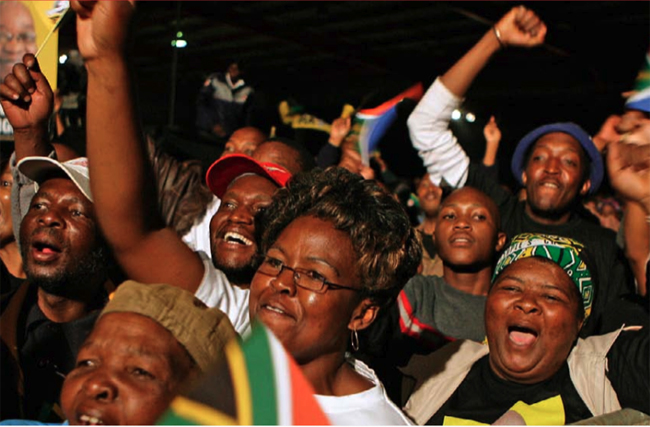Politics
South Africa’s future in black and white – and full colour

In a complicated country like South Africa, demography is always interesting. It tells you about what we will need in the future, and about what we will be like. It's a great starting point for big debates about what we actually are, and what our future will be. On Wednesday, Cabinet touched on the Population White Paper. We didn't get many details on Thursday, and don't forget, there's a census happening soon. But still, there are some big facts we can examine. By STEPHEN GROOTES.
There is a common misperception that countries at our stage of what we shall for argument’s sake refer to as “development” are destined to have ever-increasing populations. It is assumed that no matter what happens, more and more people will have more and more children. It’s your standard Malthusian nightmare: that we will not have enough resources in the future. The good reverend Thomas Malthus was writing in 1798 when he made his prediction that overpopulation would literally kill us all. The latest figures show South Africa is no different to the rest of the world in proving his prediction wrong.
Our growth in population is beginning to slow. Between 1996 and 2001, our population grew at the pretty fast clip of 2.1% a year, before slowing to 1.3% between 2001 and 2007. It’s now likely to slow further, to just 0.9% annually between now and 2014. That’s a big drop.
What this tells us (apart from the fact that we are now in the mature stage of the Aids pandemic) is that our population is becoming more middle class. As the proportion of the population that enters the middle class grows in a country, so its population growth slows. That we all know. Our population, currently hovering around the 50 million mark, will still grow. The people who are children now are still likely to have several siblings, rather than just one. So the peak will come when these families have two or three children. Then the number will come down quite quickly, as people put their resources into things other than having more children. What seems to be a golden rule of demography is that, usually, women who have access to birth control use it.
Then we have the other fact dropped before us. The population bulge that has led to there being a larger than usual number of people between 15-ish and 32-ish is coming to an end. That means that we will have a sort of dividend, a high number of people in their productive prime, and a lower than usual number receiving pensions or nappies.
There is, of course, a political dimension to all of this.
These numbers appear to indicate that the number of people who are seen as natural supporters of say, the ANC Youth League, is about to peak – and will drop fairly quickly once it does. Those same people who are currently pushing for “radical policy change” are themselves going to start having children pretty soon. Having a baby often changes one’s priorities. That hasn’t always been the case here – if you look at the numbers of single parent households, that much is obvious. But still, there should be an impact over time. To sum it up, our political balance is currently overly tipped towards the young. You didn’t notice? It is, over time, going to push back a bit, towards the more middle-aged.
Because so many of our voting patterns are centered around race, it’s useful to take a look at racial demographics there. Forget, for a moment, the usual arguments about what defines what etc. and let just look at what seems to be a really important fact.
In the 1904 census of the then four colonies that came to make up South Africa, black people made up just under 68% of the population. Now that figure is heading past the 80% mark. As a footnote, whites back then made up around a quarter of the population, compared to just over 4.5% today. So overall, the majority is becoming much more the majority, and the minorities are becoming much more in the minority over time. Yes, that means that minority voices are becoming less in number. That has all sorts of implications.
For one, it would appear to give the ANC, or whichever party claimed hegemony on black voters, reason to be even more confident going into the future. The opposite would appear to hold for the DA. It would seem that the opposition would become even smaller going forward. But that’s not how it will actually turn. Because at the same time as the majority is growing, so too is that other process of becoming more middle class is continuing – and hopefully getting stronger. This means that the politics of the majority, if we can call it that, is changing.
What we should see is that the majority starts to be less of a monolithic bloc, politically speaking, and more fragmented. In other words, there will be distinct groups within the majority, in a process that is already underway, but hasn’t yet finished. I’m not talking language or that kind of thing, I’m talking about class. Class stratification is perhaps the most important thing that needs to happen in our society. It will lead to differing viewpoints, differing priorities and differing needs. This will feed into a vibrant conversation that has nothing to do with race or identity. Rather, it will have more to do with something even more fundamentally unequal and important. Money. As Patrice Motsepe said on Wednesday, we are going to see huge changes in this economy. And part of that will be the creation of black owned businesses. With a bit of luck, the difference will be that those black business owners won’t be the more political animals that we’ve seen of late. Rather, they will be capitalist first and foremost. And making money will be what drives them, rather than any political agenda. That class will have interests hugely different to the interests of their workers, and of the unemployed.
Up until now, the ANC has always said it is a multi-class multiracial party. That much is true. But it’s also evident that its bias towards the “African in particular” is becoming more pronounced. As things progress, it would appear that the struggle to remain both of these things is going to be much harder. And that will lead to more political dynamism. Or, to put it another way, when Gwede Mantashe starts to claim that his job has become even harder, he will have demography to blame. DM






 Become an Insider
Become an Insider